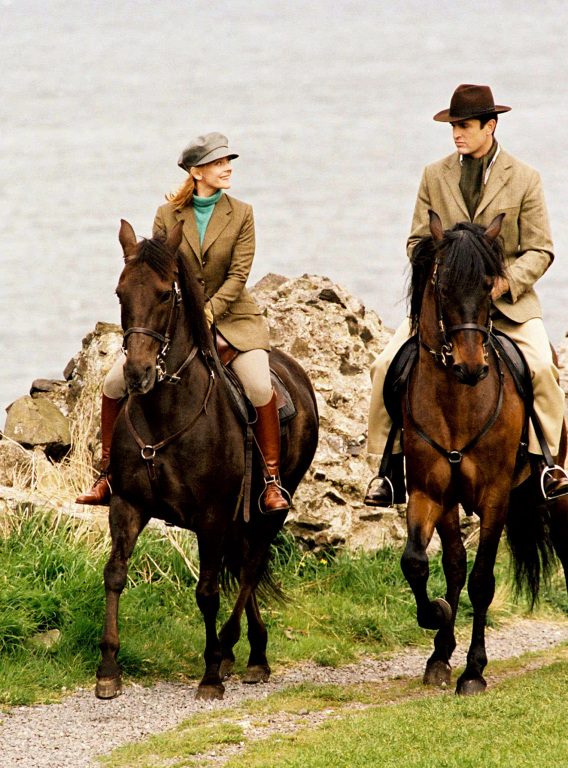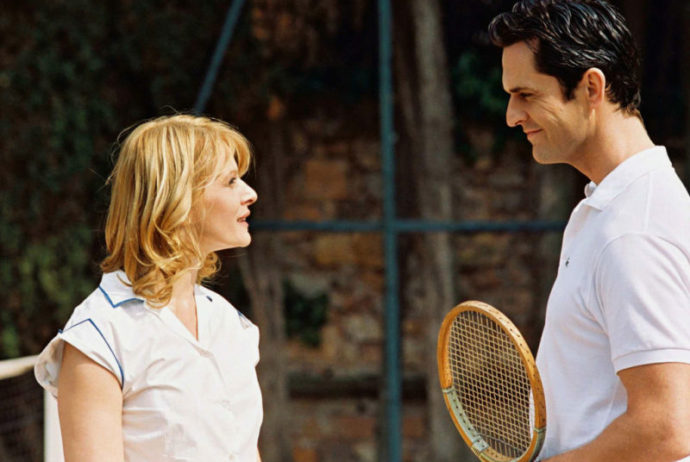Dir: Josée Dayan
Star: Catherine Deneuve, Rupert Everett, Nastassja Kinski, Leelee Sobieski
The 1988 version of this, starring Glenn Close and John Malkovich, is one of my all-time favorite films. The two leads give absolutely brilliant performances: I think Close’s may be the greatest I’ve ever seen by an actress, or close – no pun intended – to it. It sets the standard to which any other adaptation of Pierre Choderlos de Laclos’s 18th-century novel will inevitably be measured. And that’s regardless of whether or not it shares the same milieu: the six film adaptations (not including this TV mini-series) have tended to update or modify it in various ways, the settings ranging from contemporary New York to 1930’s China. However, I always find myself comparing their versions of the Marquise de Merteuil to Glenn Close.
In this case, events unfold in 1960’s France, and follow the same general structure as the “classic” version. The Marquise Isabelle de Merteuil (Deneuve) and Vicomte Sébastien de Valmont (Everett) are aristocrats who amuse themselves by toying with people’s affections, creating and destroying relationships almost on a whim. de Merteuil enlists Valmont’s aid in obtaining revenge on her former lover, Gercourt (Andrzej Zulawski), after she discovered he is now engaged to her young goddaughter, Cécile (Sobieski). She tasks Valmont with seducing Cécile, in order to wreck the engagement. But Valmont is diverted by the challenge presented by Madame Marie de Tourvel (Kinski), a virtuous and happily-married woman, whose husband is out of the country on business.
de Merteuil seeks to focus Valmont’s mind, promising to sleep with him for one night, once he has completed his corruption of Cécile. However, Valmont finds himself genuinely falling for Marie, a change that brings down the scorn and wrath of the Marquise de Merteuil. She seeks to destroy their relationship, both out of spite, and so that Valmont will focus on her task. After she also reneges on her promise after he has completed his end of that bargain, war is declared between the former allies. The results are a war that potentially will end up destroying them both, as well as those in their emotional vicinity too.
 The change in setting works perfectly well. It’s a story that is easily adaptable to any time and place where there are the “idle rich” – those with nothing better to do than play vicious games with other people. Technically, the production design is well above what you might expect from the phrase “TV miniseries”. It looks luscious: Jean-Paul Gaultier was involved in the costume design for the Marquise de Merteuil, and it’s likely also heaven for fans of classic cars. It sounds pretty damn good too. Frequent David Lynch collaborator Angelo Badalamenti provides the music, some cues in which reminded me of Jerry Goldsmith’s ominous yet melodious score for Basic Instinct.
The change in setting works perfectly well. It’s a story that is easily adaptable to any time and place where there are the “idle rich” – those with nothing better to do than play vicious games with other people. Technically, the production design is well above what you might expect from the phrase “TV miniseries”. It looks luscious: Jean-Paul Gaultier was involved in the costume design for the Marquise de Merteuil, and it’s likely also heaven for fans of classic cars. It sounds pretty damn good too. Frequent David Lynch collaborator Angelo Badalamenti provides the music, some cues in which reminded me of Jerry Goldsmith’s ominous yet melodious score for Basic Instinct.
It’s when we come to the performances that the series is most… I was going to say “underwhelming,” and that isn’t fair. In a vacuum, most of them would be entirely acceptable. It’s just, as mentioned above, that there’s this whole comparison thing going on, to the Stephen Frears’ version – and it almost never stands to Dayan’s benefit. If we break it down to individual roles, and compare the leads here to that version, that might help explain what I mean.
- Catherine Deneuve < Glenn Close
- Rupert Everett <<< John Malkovich
- Nastassja Kinski > Michelle Pfeiffer
- Leelee Sobieski = Uma Thurman
Everett is the biggest problem, perhaps the result of him being the person most obviously acting in a second language. Deneuve, of course, is a native; Sobieski’s father is French, and Kinski’s background as a polyglot should be well-known. Everett seems to be aiming to portray Valmont as emotionally dead, delivering most of his lines as a result in a flat monotone. There are times when this is effective, such as when he’s breaking up with Cécile, telling her repeatedly, “It isn’t my fault”. Though even here, it feels little more than a pale shadow of Malkovich’s iconic “It’s beyond my control.”
 Deneuve does rather better, displaying icy control throughout: that she still falls somewhat short, is less indicative of her own shortcomings, than the monumental awesomeness which was Glenn Close. I may be biased with the Pfeiffer comparison, but I found Kinski’s portrayal as the principled – to the point of saintly – Marie de Tourvel fractionally superior. This is a character which has to be so righteous, she’s capable of converting even the utterly amoral Valmont into a devoted admirer, willing to give up his wicked ways. Kinski just seems more plausible here, though Pfeiffer’s case is perhaps hampered by my not having seen her version until after Batman Returns, where she was… not so righteous, shall we say!
Deneuve does rather better, displaying icy control throughout: that she still falls somewhat short, is less indicative of her own shortcomings, than the monumental awesomeness which was Glenn Close. I may be biased with the Pfeiffer comparison, but I found Kinski’s portrayal as the principled – to the point of saintly – Marie de Tourvel fractionally superior. This is a character which has to be so righteous, she’s capable of converting even the utterly amoral Valmont into a devoted admirer, willing to give up his wicked ways. Kinski just seems more plausible here, though Pfeiffer’s case is perhaps hampered by my not having seen her version until after Batman Returns, where she was… not so righteous, shall we say!
The three episodes run a little more than four hours in total (there is also a condensed versions available, it appears). This is something of a mixed blessing. I can’t say there’s significantly more wallop here, and since it’s spread out over twice as long, the overall impact is likely diluted and lower key, particularly in the second-half. [The solution to the problem of there no longer being duels in 1960’s France, doesn’t quite satisfy either] What the expanded length does allowm us room for more background information: for instance, it seems a good deal clearer here what both Valmont and de Merteuil have to gain by cuckolding Gercourt, and why the former agrees to the plot.
All told, it’s probably good enough to rank second among the four version of the story I’ve seen. It places ahead of Valmont, mostly thanks to Deneuve, and also of Cruel Intentions, where Sarah-Michelle Gellar showed her talents were better suited to Buffy the Vampire Slayer or Scooby Doo than staging the revenge-pocalypse. Yet it still inevitably sits behind the Close/Malkovich masterpiece, for that included not only an actual performance from Keanu Reeves, there was also a future Doctor Who, in Peter Capaldi. So file this under worthy rather than necessary, since it leaves me mostly feeling a strong desire to dig out and watch my copy of the 1988 version.

“Nastassja Kinski played the young wife. She was one of the few actresses around who had not succumbed to the knife and was ravishing, if unhinged. She had a tiny voice. It was almost as if she had stopped dead in her tracks at the age of eight, but she had been on a film set all her life, so she knew how to dig her heels in when she wanted. Another fragile rock. She was a great actress, however, and her performance shone in Dangerous Lesbians (as I’d soon renamed the production).”
– Rupert Everett, Red Carpets and Other Banana Skins
https://imgur.com/cZRhvA3
Lovely anecdote! Thanks for sharing it.